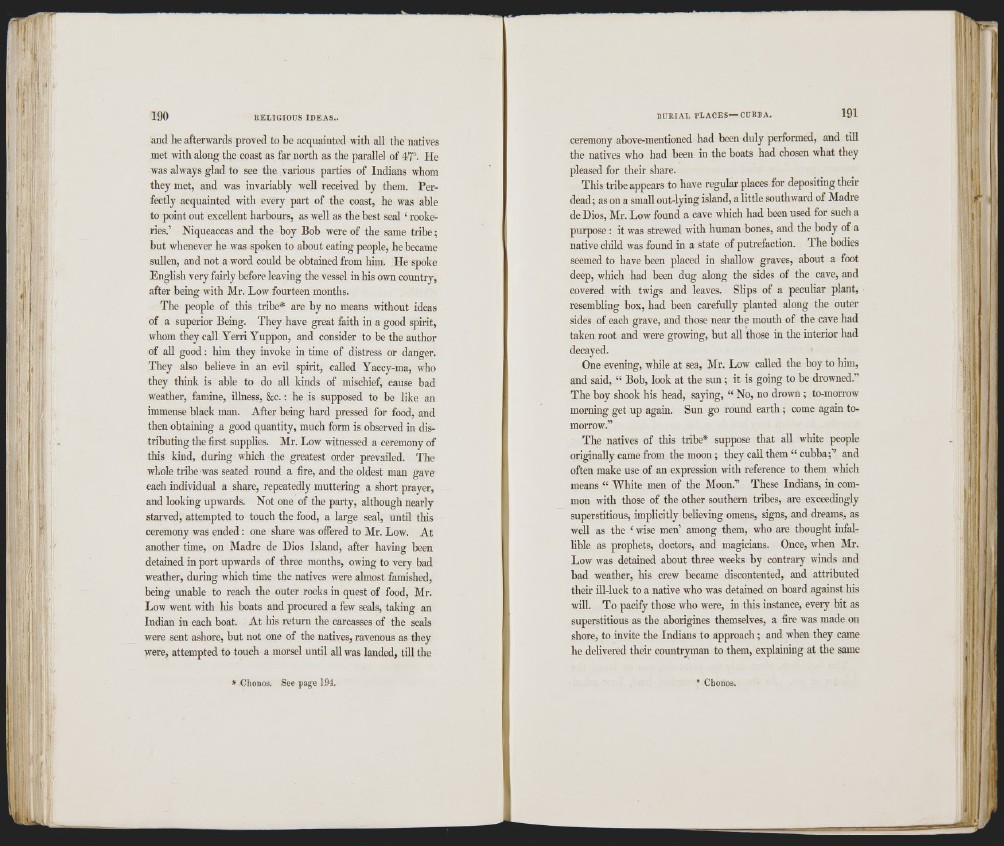
ift;
and lie afterwards proved to be acquainted with all the natives
met with along the coast as far north as the parallel of 47°. He
was always glad to see the various parties of Indians whom
they met, and was invariably well received by them. Perfectly
acquainted with every part of the coast, he was able
to point out excellent harbours, as well as the best seal ‘ rookeries.’
Niqueaccas and the boy Bob were of the same tribe;
hut whenever he was spoken to about eating people, he became
sullen, and not a word could be obtained from him. He spoke
English very fairly before leaving the vessel in his own country,
after being with Mr. Low fourteen months.
The people of this tribe* are by no means without ideas
of a superior Being. They have great faith in a good spirit,
whom they call Yerri Yuppon, and consider to be the author
of aU good: him they invoke in time of distress or danger.
They also believe in an evil spirit, called Yaccy-ma, who
they think is able to do all kinds of mischief, cause bad
weather, famine, illness, &c.: he is supposed to be like an
immense black man. After being hard pressed for food, and
then obtaining a good quantity, much form is observed in distributing
the first supplies. Mr. Low witnessed a ceremony of
this kind, during which the greatest order prevailed. The
whole tribe was seated round a fire, and the oldest man gave
each individual a share, repeatedly muttering a short prayer,
and looking upwards. Not one of the party, although nearly
starved, attempted to touch the food, a large seal, until this
ceremony was ended: one share was offered to Mr. Low. At
another time, on Madre de Dios Island, after having been
detained in port upwards of three months, owing to very bad
weather, during which time the natives were almost famished,
being unable to reach the outer rocks in quest of food, Mr.
Low went with his hoats and procured a few seals, taking an
Indian in each boat. At his return the carcasses of the seals
were sent ashore, but not one of the natives, ravenous as they
were, attempted to touch a morsel until all was landed, till the
* Chonos. See page 194.
ceremony above-mentioned had been duly performed, and till
the natives who had been in the hoats had chosen what they
pleased for their share.
This tribe appears to have regular places for depositing their
dead; as on a small out-lying island, a little southward of Madre
de Dios, Mr. Low found a cave which had been used for such a
purpose : it was strewed with human hones, and the body of a
native child was found in a state of putrefaction. The bodies
seemed to have been placed in shallow graves, about a foot
deep, which had been dug along the sides of the cave, and
covered with twigs and leaves. Slips of a peculiar plant,
resembling box, had been carefully planted along the outer
sides of each grave, and those near the mouth of the cave had
taken root and were growing, but all those in the interior had
decayed.
One evening, while at sea, Mr. Low called the boy to him,
and said, “ Bob, look at the sun; it is going to be drowned.”
The hoy shook his head, saying, “ No, no drown ; to-morrow
morning get up again. Sun go round earth ; come again tomorrow.”
The natives of this tribe* suppose that all white people
originally came from the moon ; they call them “ cubba;” and
often make use of an expression with reference to them which
means “ AVhite men of the Moon.” These Indians, in common
with those of the other southern tribes, are exceedingly
superstitious, implicitly believing omens, signs, and dreams, as
well as the ‘ wise men’ among them, who are thought infallible
as prophets, doctors, and magicians. Once, when Mr.
Low was detained about three weeks by contrary winds and
bad weather, his crew became discontented, and attributed
their ill-luck to a native who was detained on board against his
will. To pacify those who were, in this instance, every bit as
superstitious as the aborigines themselves, a fire was made on
shore, to invite the Indians to approach; and when they came
he delivered their countryman to them, explaimng at the same
Chonos.
Iii*